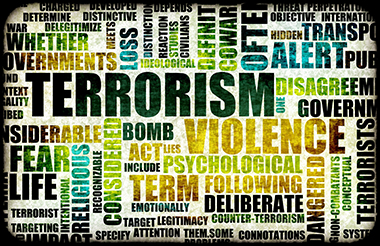Analyzing Terror
 |
|
UAlbany experts deal with the many psychological and tactical facets of terrorism, as well as methods to decrease its deadly impact.
|
ALBANY, N.Y. (May 24, 2017) — It is a sad fact that today’s world is in critical need of experts who can analyze the motives and workings of terrorists. The University at Albany has several researchers equipped to provide such analysis, as evidenced by the media’s seeking them out after Monday’s terrorist attack in Manchester, England.
Victor Asal, associate professor of Political Science, chair of Public Administration
Political scientist and expert on political violence, Asal was interviewed by the Associated Press (AP) office in London, the McClatchy news service, Swedish-based Metro International and locally on WAMC radio’s “Vox Pop.”
In addressing the topic of protecting concert venues more, Asal noted that striking a balance between security and convenience is difficult, given the cost of how much increased security will be required based on threat perception and particular targets. “What are you willing to put up with?” he asked the AP reporter.
In response to a question on what impact constant media attention might have on “maladjusted,” potential copycat attackers, Asal told a McClatchy reporter that, while copycats might exist here and there, the predominant driver for political violence today is not psychological but grievance. Dealing with social and economic grievances and the exclusion of minorities, tightening up security, and the better identification of the potentially dangerous, he told “VoxPop,” are the best measures for reducing such incidents as Manchester.
Brian Nussbaum, assistant professor, Emergency Preparedness, Homeland Security and Cybersecurity
Nussbaum, a former senior intelligence analyst with the NYS Office of Counter Terrorism, was interviewed by the New York Times on the goals of ISIS in launching such attacks on civilian populations. “It was particularly attention-grabbing,” he told the Times. “ISIS is more interested in violence for violence’s sake and the momentum that comes with that.”
Nussbaum was also the lead source for an extensive story in today’s Daily Gazette on a key goal of terrorism being to inspire over-reaction
Rick Mathews, director of simulations and training for Emergency Preparedness, Homeland Security and Cybersecurity
Former director of SUNY’s National Center for Security & Preparedness, Matthews was interviewed on camera by CBS 6 WRGB on the tendencies of terrorists to pick “soft targets” and the need for more observance by the public as well as security officials.
In addition, Brandon Behlendorf, assistant professor of Emergency Preparedness, Homeland Security and Cybersecurity was interviewed by the AP in New York regarding his expertise in illicit trafficking networks.
![]() For more news, subscribe to UAlbany's RSS headline feeds
For more news, subscribe to UAlbany's RSS headline feeds
A comprehensive public research university, the University at Albany-SUNY offers more than 120 undergraduate majors and minors and 125 master's, doctoral and graduate certificate programs. UAlbany is a leader among all New York State colleges and universities in such diverse fields as atmospheric and environmental sciences, business, education, public health,health sciences, criminal justice, emergency preparedness, engineering and applied sciences, informatics, public administration, social welfare and sociology, taught by an extensive roster of faculty experts. It also offers expanded academic and research opportunities for students through an affiliation with Albany Law School. With a curriculum enhanced by 600 study-abroad opportunities, UAlbany launches great careers.


